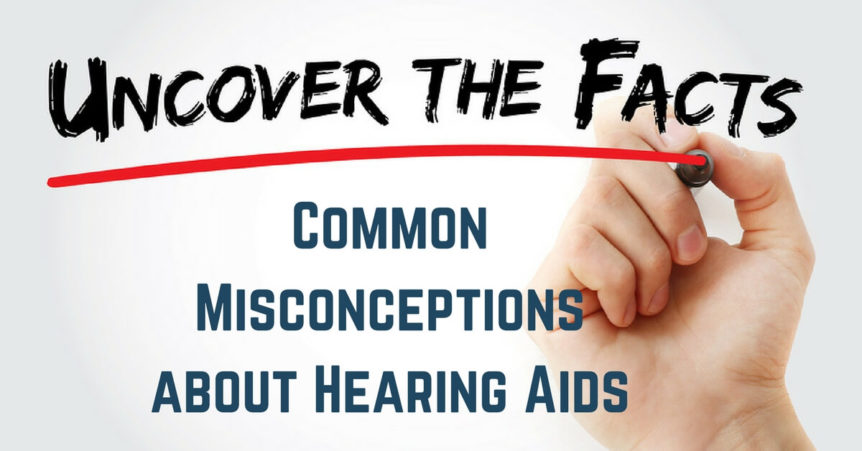Everyone seems to have their own ideas about hearing aids. With half of all seniors over the age of 75 struggling with hearing loss, either you or a loved one could need hearing aids. Unfortunately, according to the American Speech Language Hearing Association, only 25% of people who need hearing aids get them! It’s time to reevaluate what you know about hearing aids, and see if you have some misconceptions about hearing devices that’s stopping you from treating your hearing loss.
Misconception: Only Old People Need Hearing Aids
You might be worried that investing in a pair of hearing aids will push you over the hill, and make you seem old. After all, only old people need hearing aids, right? Wrong. While it is true that many seniors suffer from hearing loss, they’re not the only ones who benefit from hearing devices. Hearing loss can happen at any age, and many adults in their 40s and 50s are experiencing hearing loss due to extremely loud workplaces. Children and teens are also at risk of hearing loss, since they too live in this noisy world, and often listen to music using earbuds, blasting music right into their ears and damaging the delicate cells of the inner ear. Hearing loss can affect anyone, and people of all ages wear hearing aids to improve their hearing and their quality of life.
Since people of all ages need hearing devices, today’s hearing technology caters to every need, providing hearing aids that have a beautiful as well as functional design. There many programs and settings can be controlled by a smartphone app, and many even have streaming capabilities for ease of listening to music, watching TV, or talking on the phone.
Misconception: Hearing Aids are Ugly and Clunky
We know what kind of hearing aid you’re thinking of, the first set of hearing aids your friend purchased over ten years ago. They were bulky and heavy, and whistled when you hugged them. Hearing aid technology has improved in leaps and bounds, and today’s sleek, sophisticated devices are nothing like the hearing aid you’re picturing. Hearing aids come in many styles, from the classic behind the ear device, to hearing aids that sit in the ear, or are even tucked into the ear canal itself. We know you don’t want everyone noticing your hearing aid, but with our discreet devices, the only thing people will be noticing is that your hearing has improved. Some hearing aids are as small as two blueberries stacked on top of each other!
Misconception: I Have One Good Ear, I Don’t Need Hearing Aids
It’s a common misconception that you have a bad ear and a good ear. It’s true that one ear may be worse than the other, but 90% of the time hearing loss occurs bilaterally, or on both sides, as a result of natural aging or exposure to loud sounds. Remember, it’s all about perspective. You might favor one ear, and always use that ear to talk on the phone or angle towards the person speaking, but just because it’s not as bad as the bad ear doesn’t mean it’s good. If you want to give yourself the best future full of easy communication with the people you love, drop this misconception, and get a hearing assessment. You’ll be surprised at what getting hearing aids for both your ‘bad’ ear and ‘good’ ear can do for you.
Misconception: Hearing Aids Don’t Work for Everyone
Did you recently have a friend purchase hearing aids, only to be unhappy with the end result? Hearing loss is different for everyone, and that’s why it’s important to talk to a hearing specialist and get the hearing aids that will work for you. With endless programs and setting that cater to your every need, finding the right fit for your lifestyle is important for hearing aid success. Picking the right model is important, but you also need to choose a device that has programs to help you hear where you need it most, whether that’s in your own living room, at work, or out with friends. That’s why we’re here to help you make the right choice. Hearing aids are the most common and effective way to treat hearing loss, and we want you to enjoy a life of hearing. Don’t let hearing aids scare you, but visit us today at Neighborhood Hearing Aid Centers to talk about what you do and don’t know about hearing aids, and to find the device that perfect for you.

